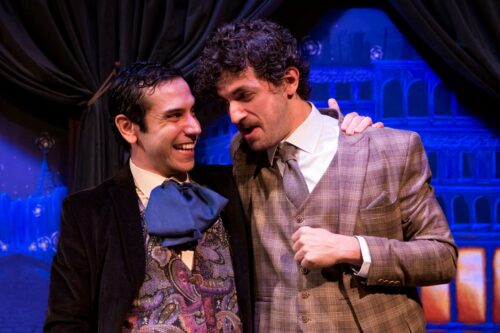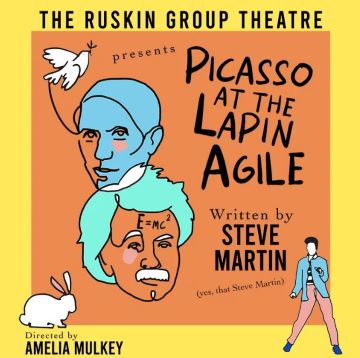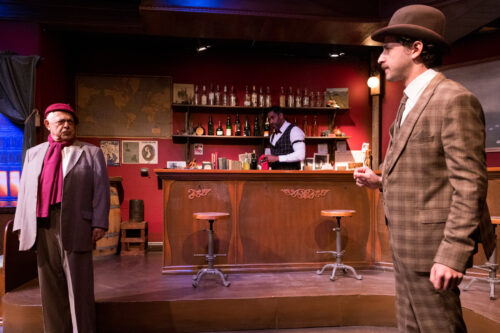HELP WANTED AT THE LAPIN AGILE
As I wrote last Sunday in my review of Sunday in the Park with George: “art isn’t easy.” Having just now seen Picasso at the Lapin Agile, I’ll add to that Sondheim quote: “’”especially comedy.” Opening last night at The Ruskin Group Theatre in Santa Monica, this 1993 comedy by Steve Martin, like that Sondheim musical, is a fictionalized account of a famous painter: in this case (move over Georges Seurat!) it is Pablo Picasso, and his imagined meeting with Albert Einstein. On the play’s advert, the Ruskin writes: “Written by Steve Martin (yes, that Steve Martin).” And yet, through most of this 85-minute one-act, the humor which makes Martin so beloved is buried, layers deep, on the canvas. Comedy isn’t easy.

Isaac J. Cruz, Ryan Stiffelman Isaac J Cruz, Fred Deni, Amy Motta, and Ashley Barrett
The play opens at the dawn of the 20th century in the Lapin Agile, an intimate Parisian cabaret made famous by Pablo Picasso’s 1905 oil painting, Au Lapin Agile. (French for “nimble rabbit,” the bar is not to be confused with the Moulin Rouge, the cabaret’”a bunny-hop away from the Lapin’”which serves as inspiration for a much flashier stage show.) The year is 1904. Inside said tavern, a bartender (J. Teddy Garces, “Freddy”) and his waitress girlfriend (Amy Motta, “Germaine”) chat it up with an old barfly (Fred Deni, “Gaston”) and a sultry young woman (Ashley Barrett, “Suzanne”). In walks a pre-fame Albert Einstein (Ryan Stiffelman), a 20-something theoretical physicist who engages their “small talk” with “big talk.” If that weren’t peculiar enough, about a half-hour later another 20-something makes his entrance: Spanish painter and (eventual) co-founder of the Cubist art movement, Pablo Picasso (Isaac J. Cruz).
Ryan Stiffelman and Ashley Barrett
With a set-up like this, it’s no wonder that Picasso was written by American comedian (and writer, producer, and musician) Steve Martin. A notorious goofball, Martin is also quite sensitive, thoughtful. Picasso, the Bright Star playwright’s first full-length play, is as cerebral as it is absurdist. Without the right troupe of actors united in a clear, singular vision, it’s a tough nut to crack. Under the direction of Amelia Mulkey (next to whom I was seated Opening Night’”no pressure!), this largely miscast, misdirected work struggles to achieve the delicate balance of quirk and poignancy to which it aims. Sure, Martin’s 30-year-old script is by no means a marvel’”it’s light, corn-syrupy. Yet even through a production riddled with sapless line readings and quizzical accents, I could imagine the play, in better hands, getting the laughs and aws it deserves.
J. Teddy Garces, Jack Merrill, Isaac J Cruz, Amy Motta, Fred Deni
Many in the cast drag what should be a far livelier scenario. In the deadened weight of jokes that fail to land, it becomes apparent how dull’”and quiet’”the bar is. Except for the play’s intro and outro, music is absent from the work, especially from its supporting players. More positively, Stiffelman, as Einstein, is enigmatic, arousing interest from the audience. But it’s not until Picasso shows that the play truly begins. As the famous painter and oh-so-horny Spanish lover, Cruz is passionate, competitive, fiery’”giving it his all, and the best performance in the show. Also commendable are the endearing Hudson Long as Charles Dabernow Schmendiman (an inventor with a bravado as big as his ridiculous name) and Jackson Glenn as a handsome, sweet-talking crooner.
J. Teddy Garces, Amy Motta, Jackson Glenn
The overall design is quaint if “on a budget.” Set designer Ryan Wilson’s bar, well-lit by Edward Salas, is charming, featuring painted window-scenes and an impressive, overhead beam vined in spirited, artsy decor. Michael Mullen’s costuming appears fitting for the period, though a “quieting” of his more fanciful (sometimes clashing) pieces could enhance their aesthetic harmony.
Fred Deni, J. Teddy Garces and Ryan Stiffelman The Cast
Part of Picasso’s charm is its meta self-awareness. (When a lover of Picasso inquires when he’ll come for her, he responds, “When the play is over”; similarly, a young, hip Einstein crazies-up his hair in order to be more recognizable as his future self.) As with Sunday in the Park with George, Picasso at the Lapin Agile is a work that contemplates legacy; in the latter, it’s the legacies of 20th-century visionaries who, in their respective fields, forever change the world. While overtly silly, Picasso is also sweet, sentimental. Through comedy, it highlights the inherent beauty of the arts and sciences. And yet, the poor pacing, miscasting, and mixed performances in this uneven Ruskin production prevents its full realization.
photos by Khue Cai
Picasso at the Lapin Agile
Ruskin Group Theatre
John Ruskin and Michael R. Myers, producers
3000 Airport Ave in Santa Monica
Fri and Sat at 8; Sun at 2; ends on April 2, 2023
for tickets ($20-$35), call 310.397.3244 or visit Ruskin



{ 2 comments… read them below or add one }
I saw this at The Old Globe with an uneven cast as well. But in the end, I strongly believe this play would hardly be produced were it not for Steve Martin’s name attached to it. Brainy, sometimes funny, sometimes embarrassingly silly, it’s simply not a great play.
I saw this on Sunday, 2/26.
Have seen many fine I plays at The Ruskin, but this one is not up to their usual standards. The acting was amateurish at best. I have seen community theater productions that were far superior. Often, it seemed as if the actors were merely reciting or reading their lines.
The performance dragged, the accents were poorly rendered (I do voiceovers) and inauthentic. The timing was ineffective, so most of the jokes fell flat or simply never materialized.
Steve Martin’s brand of silliness has never struck me as authentic comedy and his pretentions to intellectualism in the poorly conceived script are pathetic.
The lack of effective direction and the poor casting were largely to blame for this tedious flop.
Unfortunately, there was no intermission. Had there been one, I would have left then.